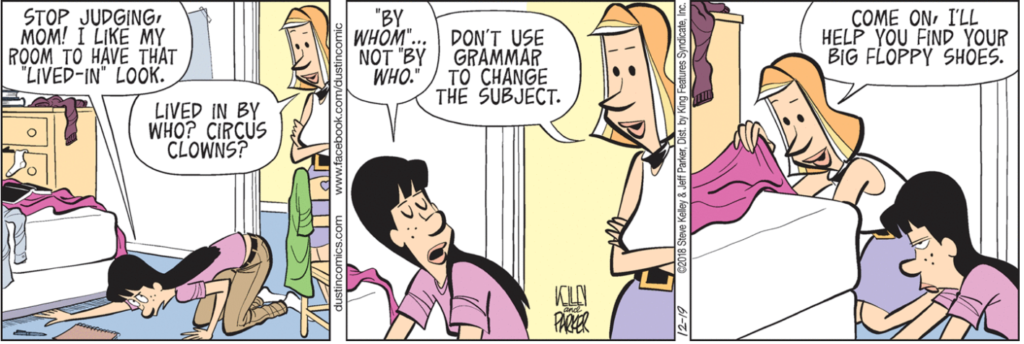Okay, the comic is dated, but the message isn’t:
Don’t trust the spell checker!
Okay, the comic is dated, but the message isn’t:
Don’t trust the spell checker!
Here’s a rule:
Semicolons separate independent clauses.
Commas separate parts of a sentence.
An independent clause is a sentence that happens to be attached to another sentence. An independent clause has its own subject and verb, and could stand alone. In fact, the decision as to whether to make something a stand-alone sentence or an independent clause is often a matter of preference—the choice can affect the tone of the writing, but both choices are grammatical.
Here’s a sentence that gets it wrong:
A transition is a one-way link, if an issue moves back and forth between two statuses; two transitions should be created.
https://www.tutorialspoint.com/jira/jira_quick_guide.htm
That comma should be a semicolon. Even a period would work. And that semicolon should be a comma. The “if…” part goes with what follows; it’s a dependent clause (called a protasis, if you want to know the technical term). So here’s what the sentence should look like:
A transition is a one-way link; if an issue moves back and forth between two statuses, two transitions should be created.
Feels better now, doesn’t it?
Redundancy is when you unnecessarily repeat yourself. Conciseness is when you’re not redundant. (Terseness is when you take out too many words) Good writing is concise. No unnecessary words. This applies to especially to expository writing. If you’re writing a love letter or a poem, it’s okay to not be concise. But when you want to explain something, be concise.
Here’s an example of not being concise:
The [watch and clock] tax was repealed after a campaign by the Clockmakers’ Company, and promptly replaced by Income Tax, which U.K. citizens still pay to this day.
https://www.atlasobscura.com/places/the-clockmakers-museum
You could write, “…which U.K. citizens still pay” or you could write, “which U.K. citizens pay to this day.” Both have exactly the same meaning, and each way of writing concisely has more punch than the original.
So write punchily!
PS—here’s a picture of a timepiece designed to minimize that tax.

A word that I don’t see used very often to represent a generic human is one. As in “How does one get this horse to stop?” Better, perhaps, to be more specific and say “rider” instead, but “one” works.
Here’s another such word. First panel, and the punch line.
If I run into a contemporary use of “one,” I’ll add it to the post.
A grawilx is a string of random punctuation used in comics to represent profanity. Today’s lightweight post is a pun on grawlixes.
They’re even all six-sided!
The past tense of the intransitive verb”lie” (as in I lie down) is lay. We tend to use “laid” (past tense of “lay,” which is transitive, as in” I will lay the book on the table”) because we’re used to having a -d on the end of our past-tense verbs. This guy gets it right:
The caption is: “Aircraft hangars lay scattered in pieces across the flight line at Tyndall Air Force Base after Hurricane Michael made landfall on Oct. 10, 2018. The storm had exploded from a tropical depression to a major hurricane in two days over warm Gulf waters. Credit: Staff Sgt. Alexander C. Henninger/U.S. Air Force”
Good for him!
Changing the subject is a common defense mechanism, I think.

The kid is right about the grammar, though. “Whom” is the object of a preposition.
I run into this mainly in spoken English. Saying “is” twice.
“The reason that technology is interesting is, once you do this process of focusing the light to get heat, you can store heat much more cheaply than you can store electricity,” says Asegun Henry, lead researcher on the study.
https://newatlas.com/mit-molten-silicon-energy-storage-system/57562
Having “is” in there twice seems wrong, doesn’t it? It’s not!
Let’s parse the sentence. The subject is “reason”; “that technology is interesting” is a subordinate clause that functions as an adjective describing “reason.” So what’s the main verb? It’s that second “is.” (Everything from “once” to “heat” is parenthetical, so you can set that part aside.) Then we have “you can store heat…” and that’s a noun clause, a predicate nominative.
So we end up with “The reason is (that) you can store heat.” It’s a perfectly grammatical sentence, if somewhat cumbersome.
Woof! Let’s do a comic in the next post.
The last post was about pairs of words that people get mixed up. Here’s another pair. They aren’t even synonyms.
A premise is a starting point in logic, a foundational statement. For example, “All men are mortal” is a premise.
Premises refers to property, buildings, land, and so on, occupied or owned by someone or something. It always ends in “s” and we usually treat the word as a plural.
The two words are not synonyms!
Here’s an example of correct usage:
Kubernetes is currently supported as a hosted service on all three major public cloud providers—Google, AWS and Microsoft Azure—and has a broad system of vendors that also provide Kubernetes distributions that can run on-premises or in the cloud.
http://www.eweek.com/cloud/top-five-reasons-why-kubernetes-is-changing-the-cloud-landscape
If the article had said “on-premise” it would have been incorrect. I’m not goint to quote anyone using the word incorrectly because I don’t want to embarrass them. But I could.
PS—Alert readers might notice that I used a singular verb, “refers,” in my definition of “premises.” Was I treating “premises” as a singular? Well, no. I elided (left off) the actual subject of the sentence, which is “The word.” I could have written “The word “premises” refers to…” but I wanted to be concise. And it gave me an excuse to put in this postscript.
Semicolons are rather like strong commas and weak periods. The rhino geek below makes a point that’s usually true. Semicolons are supposed to connect two independent clauses that are on the same topic. In other words, closely related sentences. Independent clauses don’t usually start with a conjunction.
The rule about conjunctions is a bit mechanistic, though usually it’s correct. Too bad for him.